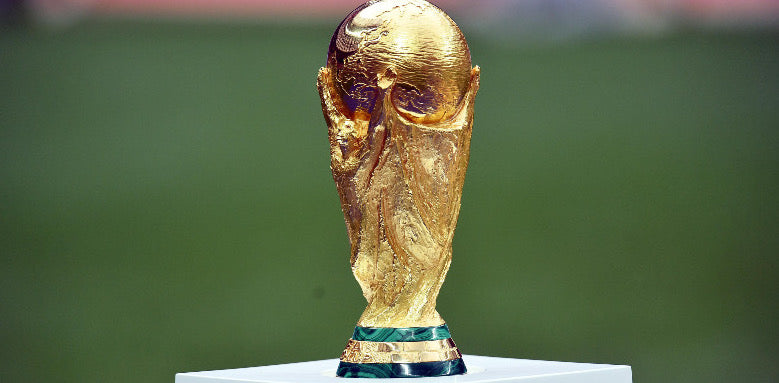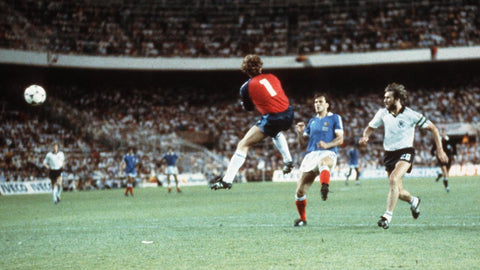
Top 10 Reasons We Love the World Cup
The World Cup is in one year!
THE most popular tournament in the world, and the largest sporting event in the world, has always provided us with unforgettable moments. In 2018, a record number of fans gathered to watch the football fiesta with a whopping 3.572 billion people tuning in around the globe.

“The World Cup is the biggest sports event in the world because football itself is the most popular sport in the world, and it’s the most popular sport in the world because it’s the simplest sport,” said Paddy Agnew, a Rome-based soccer reporter for World Soccer magazine. The biggest patriotic act that most people engage in is cheering on their team during the World Cup.
The World Cup pulls in people who otherwise have no interest in football. We were strolling through the streets of Boston, Massachusetts during the 2018 World Cup and it seemed the world stopped. In the middle of the day, masses gathered around screens in pubs and pop-up big screens with projectors in courtyards.

Top 10 Reasons We Love the World Cup
For most of the world, it reaches such a profound level because it is a representation of their country and their people to the rest of the world. The World Cup has a way of enabling communities to puff out their chest, giving them license to say “this is our team,” taking pride in their nation.
No other sporting event does this because no other sport truly embraces so many people from every corner of the globe. No other sport comes close to matching the worldwide passion for the beautiful game. Here are the top 10 reasons why we love the World Cup.

- The World Cup Brings People Together
No event on the planet - not even the Olympic Games - brings people together like the World Cup, regardless of their age, race, gender, culture, or nationality. After England's win over Colombia, the Red Lions' head coach Gareth Southgate joined Colombia's head coach Jose Pekerman in consoling Mateus Uribe. It’s not just players consoling each other after a match. Off the pitch, fans from opposite teams also comfort each other. A crowd of Colombians did just that after seeing a devastated young Polish fan crying inconsolably after his team lost to the South American country.

- The World Cup is the Single Biggest Sporting Event on the Planet
Since 1998 the FIFA World Cup has averaged approximately 3 billion people who have tuned in to the tournament, with the 2018 Russian World Cup topping 3.57 billion viewers and spending an astounding $14.2 billion - the most in World Cup history. By comparison, the global audience for the Super Bowl is roughly 150 million people each year. The 2021 Olympics brought in approximately the same amount of viewers as the Super Bowl at ~150 million...

- Communion Between Players and Their Fans
This is more than a game as players truly represent their country. It's not about the money, or their contract or off-pitch life. It is purely for the pride of doing something amazing for your country. Knowing that your city, your country will be behind you, and that every win will bring joy and pride to the whole country!

- Players Sharing a Moment of Reflection Despite Their Differences
Even coaches from the opposite team are seen consoling players from the rival team after a tough game. Some of them are sometimes caught sharing a moment of reflection or prayer before or after a game. After battling for a position in Round 16, Panama's Fidel Escobar was seen being joined by Belgium's Romelu Lukaku in a moment of reflection after the game.

- Coming Together to Celebrate a Victory Despite Different Nationalities
Football is a universal language that we speak with different accents. Nothing symbolizes “World Cup” more than different nationalities celebrating a victory together. Mexican fans celebrated South Korea's win against Germany as it saved Mexico from elimination despite their loss to Sweden that same day, for example. As we move through the tournament, we join forces with unlikely friends with our foes.

- Life-changing Event
Most Latin American countries come to a full stop simply because the national team plays in the World Cup… school, post office, everything simply stops! The World Cup sparked a profound win for the women of Iran as they were allowed to watch a qualifying game alongside men in a stadium — for the first time since 1980... These are moments to be celebrated and remembered.

- Unexpected Friendships
One of the best things about the World Cup is the unexpected friendships that flourish from the event. Some of our most solid memories are of where we were and who we met during the games, perhaps out of nowhere, who then became friends for life. Fans from different nationalities have been caught on camera trading jerseys, embracing each other after a game and even singing together.

- Remembering Loved Ones With a Passion for The Beautiful Game
Each World Cup gives us new memories, but it also makes us remember the past. People coming together to cheer for their countries often remind us of our grandpa or uncle, who may no longer be with us, but introduced us to the game. We remember watching World Cup games during life-marking events, like birthdays, communions and anniversaries, and with the people we love. It is also a time to celebrate. We watched Diego's hand of god during one of these events.

- Building Memories for Life
Where were you on the 8th of July, 1982? For us, we were in Seville, Spain (even though we were not there physically). If you are reading this, you probably know what we are talking about… Regardless of your origins or favorite team, this day marked one of the best games in the history of the World Cup. West Germany vs France was a FIFA World Cup semi-final match that took place at the Ramón Sánchez Pizjuán Stadium. Although France and Germany had faced each other 15 times before, this was only the second meeting between the two teams in a major international tournament.

The first half was marked by exhilarating football. It is the memory of an incident that occurred in the second half of the match that will forever be etched in our memories of this World Cup. Midway through the second half, French substitute Patrick Battiston found himself one-on-one with German goalkeeper Harald Schumacher. With virtually no chance of getting to the ball before Battiston, Schumacher failed to check his run and crashed knee first into the ribs of the Frenchman, who fell, unconscious. Battiston suffered 3 fractured ribs, 2 broken teeth and a damaged vertebrae as a result of the collision. The impassive nonchalance of Schumacher, who waited to take the goal kick as Battiston lay motionless on the pitch, inflamed the French and set the tone for the rest of the match.
In overtime, German hopes were crushed as Alain Giresse curled home from the edge of the box to double France’s advantage and put them up 3-1. France was going to their first World Cup final ever!
The German national team coach sent Karl-Heinz Rummenigge onto the pitch. The change worked almost immediately as Rummenigge struck on the stroke of the first half of extra time to bring West Germany back into the match. Klaus Fischer scored an acrobatic overhead kick 3 minutes into the second half to complete one of the most remarkable comebacks in World Cup history and send the match into a penalty shootout.
In the shootout, Harald Schumacher saved Didier Six and Maxime Bossis’ shots to send West Germany into the final of the World Cup, where they would eventually lose to Italy. Despite losing, French legend Michel Platini would go on to describe the match as the “most beautiful game.” Platini further went on to say, “What happened in those two hours encapsulated all the sentiments of life itself. No film or play could ever recapture so many contradictions and emotions. It was complete. So strong. It was fabulous.”

-
Where Legends Are Made!
No player can truly reach LEGEND status without participating in and having an impact in a World Cup. Plain and simple. Even if they don’t finish on the winning side, all legends have had a place in this tournament. In today’s fragmented media network, the World Cup is the last massive event where entire nations watch at the same time. Pelé is the very first and best example! “Unlike the Olympics, the World Cup is the only truly, single-sport global event,” said Nigel Reed, soccer commentator for CBC Sports. We cannot wait to see which players and teams are elevated to the status of legends in this upcoming World Cup.
Be a TENLEGEND.™
